原子力显微镜
AFM配件
应用
联系我们
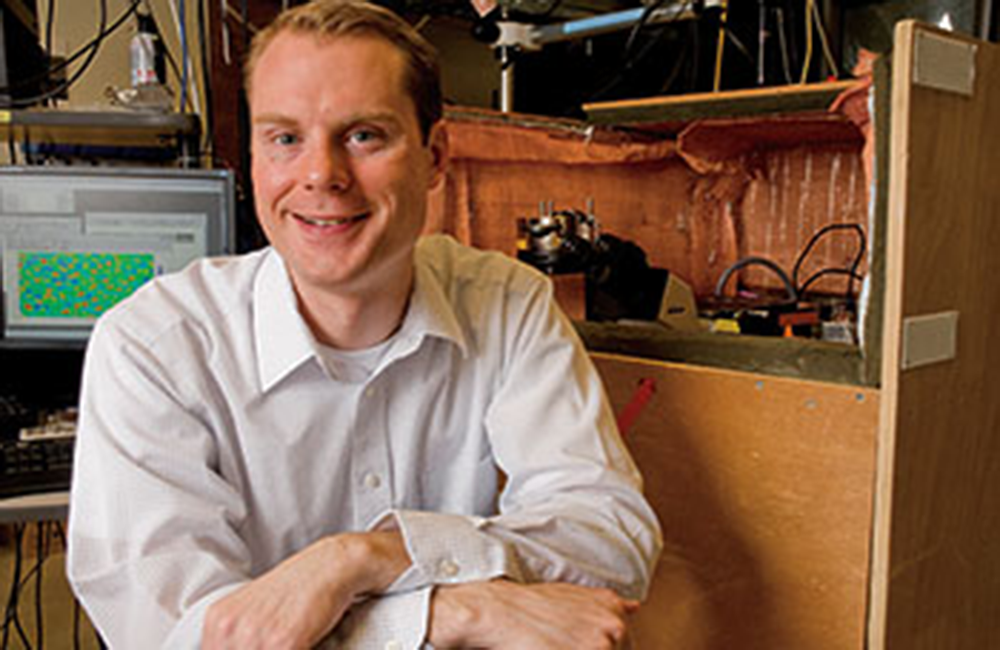
"The customizability of the MFP-3D and Asylum's support were critical to the success of the experiments that got me tenure."
“Asylum’s MFP-3D is a powerful and highly flexible system that makes your daring experimental ideas come true.”
Sergei Kalinin, Oak Ridge National Laboratory (ORNL, Center for Nanophase Materials Sciences)
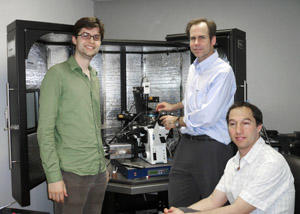
""We chose Asylum's MFP-3D-BIO AFM because it has the most powerful AFM capabilities of the inverted optical integrated systems - and we have not been disappointed. It excels in all aspects, from optical integration to high-resolution imaging and dimensional measurements to force spectroscopy and elasticity measurements of soft tissue matrices. We were also among the first few Asylum customers ten years ago with the MFP-1D, and we still abuse it! Asylum's quality and reliability allow us to focus on the science."
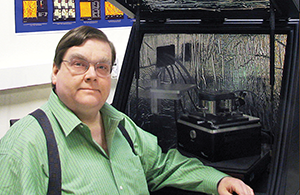
“In case anyone’s interested, we generated detailed instrument use statistics for my facility for the past fiscal year (actually June-May) and my Asylum instruments logged some pretty heavy usage for the year. My two MFP-3D systems logged 3046 hours and 3023.5 hours of use, so they each averaged over eight hours every single day spread over 365 days. All this with truly negligible downtime. Amazingly robust systems. Great job!”
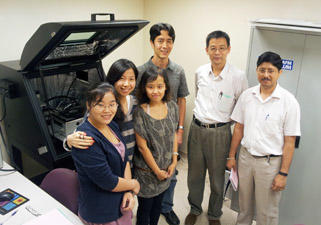
"AR’s MFP-3D works great for us, not just its superior quality and capabilities on PFM, but the MFP-3D also has unique capabilities on CAFM, KPFM, MFM, as well as numerous accessories such as for controlling temperature, sample environment, and high voltage. I have found the machine is easy to learn, to operate and maintain. The Asylum Research technical support is also great; we always can get our problems solved very quickly."
“The recent results I’ve seen from Asylum’s Ztherm Modulated Thermal Analysis are the highest resolution thermal measurements by anyone to date. Truly impressive!”
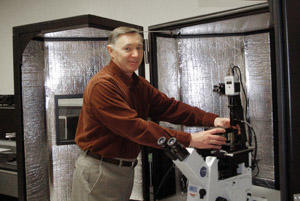
“Our MFP-3D is a highly reliable and key tool in our NanoImaging Core Facility and is used heavily both locally and for our national and international collaborations. In addition to “traditional” imaging in air, it has outstanding capabilities for imaging in liquid and performing reliable and accurate force measurements. The simplicity of the software allows us to easily train students, yet the open setup of the instrument makes it flexible and powerful for very high-end scientific projects, including nanolithography and nanomanipulation.”
"I LOVE IT! The MFP-3D completely exceeds my expectations. In fact, it's too much (and it's only going to get better). Mario Viani has been great, and I'm certain I could learn more physics from him in a week than in an entire Grad degree. But that seems to be AR's trademark. Great scientists behind great gear. You might think I'm being too effusive, but I haven't yet started..."
Tim Senden, Dept. Applied Mathematics, The Australian National University
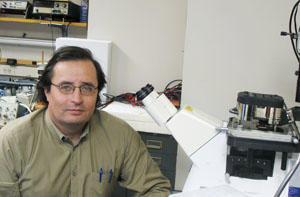
"The MFP-3D-BIO is a research instrument through and through and designed for the scientist. The optical integration is exceptional, and the flexibility of the platform offers almost endless possibilities."
Jan Hoh, Johns Hopkins University
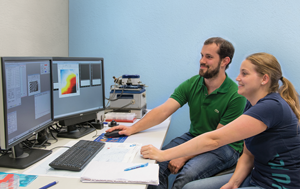
“The MFP-3D Origin has proven itself as a top quality research AFM in our lab. Our main project now involves molecular recognition on soft biological samples,which requires low-noise, high-resolution force mapping. We especially appreciate the flexibility that it provides in terms of both the measurements supported and the ease with which we can create custom analysis routines.”
Felix Hilpert and Franziska Wild, lab of Prof. Thorsten Röder Mannheim University of Applied Sciences
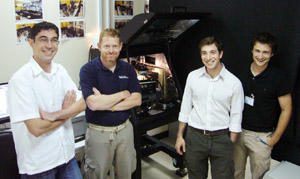
"After reviewing many instruments I chose the best AFM combined with the most elegant and simple-to-use nanoindentation tool. Asylum Research professionalism was a striking factor in choosing the right characterization tool. For a new graduate university in a region where technical support can be very challenging, Asylum Research has shown a dynamic attitude in providing a solution for the needs of my laboratory."
Matteo Chiesa, Masdar Institute of Science and Technology, Abu Dhabi
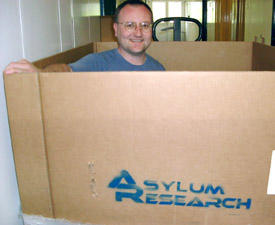
“As soon as I saw the manual approach system, and the analogue hamster wheel for software adjustments, it occurred to me that here was an instrument designed by people who think much like I do. It’s really well thought out and nicely put together – it’s clearly built to last and has a quality feel to it. The software is phenomenal, it’s completely customisable. The MacroBuilder facility is a particular highlight for me – and should you wish to do something a bit unusual there is usually a script that can sort you out. If you can’t figure it out yourself the guys at Asylum are only too willing to help.”
Andrew Kirby, Institute of Food Research, Norwich, UK
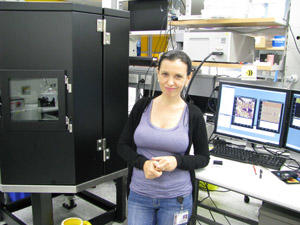
"I have been using the Asylum Research MFP-3D-BIO AFM for the last 5 years and I must say that the equipment is a treasure from all points of view. It is versatile, has powerful capabilities and high precision which along with excellent service it makes everyone’s life in the lab easier. The Innovation Group, the Australian representatives of Asylum Research, helped us twice in the past year in regards with our MFP-3D-BIO system. I was amazed how quickly they identified the issues and the damaged components of our machine. Then it was really remarkable how prompt the American team in Santa Barbara brought back to life our equipment. Thank you both, Innovation Group and Asylum Research!!! You have a very happy customer here at the University of Queensland."
"The MFP-3D is an excellent system with a very user friendly interface. Students who are just starting with AFM can obtain useful data within relatively short time (which is also thanks to the wonderful customer support provided by Asylum Research)."
“I am so pleased that I decided to purchase the MFP-3D-BIO AFM and am also quite happy with how great it has been to work with you folks at Asylum. There is huge excitement here and I do feel that it has allowed our work to be taken to a completely different level – and to enable us to make some pretty profound observations that may prove relevant for cancer diagnosis/prognosis and perhaps even therapy. The whole mechano field is just blowing wide open, not just in cancer but in an array of fields. We have created so much interest in using this approach in biology that there are loads of folks who want to collaborate, both inside and outside UCSF.”
"Asylum is a Rolls Royce level of AFM."
Din Ping Tsai, Distinguished Professor of National Taiwan University, Taiwan
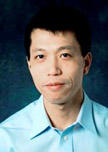
"I have to mention to you that the Asylum MFP-3D AFM is the best investment I have ever made. It is used extensively in my lab to probe functional materials, and helped us to secure several projects. It also played a key role in my student's successful fellowship application. I cannot say enough about my appreciation of all your help and your great microscope."
"One of main obstacles to improving plastic solar cell performance is the lack of morphological control for solar cell materials, as well as understanding of device physics. Conductive and photoconductive AFM are currently the only techniques shedding light into device operation.
Integrating inverted optical microscopy and a light source, the MFP-3D-BIO AFM from Asylum Research provides both Conductive AFM when the light source is off and Photoconductive AFM under illumination. In the dark condition, information on charge transport can be extracted, such as conductive pathways and local mobility relating to formation of bicontinuous networks of donor and acceptor. Under illumination, charge generation and charge collection indicating device performance can be obtained. With such capabilities and reliability, The MFP-3D is the most powerful system for deeply understanding chemical structure/processing condition/device performance relationships. Another excellent function is that with MFP-3D AFM, the origin of local open-circuit voltage can be elucidated by light intensity dependence studies. These are the reasons why we have chosen the MFP-3D for studying solar cells.”
Xuan-Dung Dang, Thuc Nguyen lab, University of California, Santa Barbara
“The MFP-3D-BIO system is absolutely fantastic and everything we've tried so far has worked beautifully!”
Rebecca Wilusz, Duke University
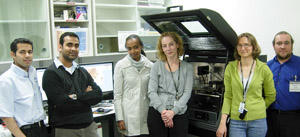
“We chose Asylum’s MFP-3D AFM because we found it to be the most powerful and easy to use AFM available. It is the only system capable of imaging complex samples with very rough topographies at the nanoscale, and we were impressed by its excellent optics for locating areas of interest for AFM scanning. Sample loading and unloading and tip exchange are faster and more intuitive, and the post-data collection processing capabilities are clearly superior. We are excited about applying the MFP-3D to our nanotoxicology research initially and to other Museum studies in the near future.”
Eva Valsami-Jones, London Museum of Natural History
"I bought my MFP system in 2007 and it has been running non-stop ever since. This is the most robust instrument I have ever seen and the support is the best in the business."
“Our MFP-3D-BIO is a technological treasure. We have coupled our AFM with a fluorescence microscope and added environmental control and have as a result a platform of exceptional precision. This versatile instrument has allowed us to efficiently perform experiments on light-sensitive nanoparticles, clays, and bacterial biofilms, as well as perform nanomanipulations of epi-structures of bacteria, including molecular stretching and biomolecular recognition. We are now going to upgrade our system with a BioHeater to perform experiments on chemical and enzymatic kinetics with controlled temperature.”
Grégory Francius, Université de Nancy
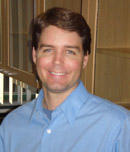
"I spent five years as a post-doc using an MFP-3D, so when I started my own lab at Brown, it was an easy decision to choose the MFP-3D-BIO because I knew I’d get a high-quality, versatile device along with Asylum Research’s outstanding customer service."
"We got an MFP-3D-BIO as our first AFM, and we are very happy with the instrument and the support. Some sales people try to talk their customers into buying their products – Asylum simply convinced us that the MFP-3D is the best AFM for our needs."
Martin Beyer, University of Kiel
"We have chosen the MFP-3D-BIO because of its powerful capabilities, its flexibility and reliability. The MFP allows us to perform a large variety of studies with high precision in our areas of research, from bionanotechnology to biophysics. Because of all these characteristics and Asylum’s exceptional customer service, we are really happy about our choice. The MFP AFM excels in all aspects, from topographical studies to force measurements. The MFP-3D is an instrument of great quality, with a simple configuration."
Csilla Gergely, Univeristé de Montpellier
"We love Asylum AFMs and had been waiting for the funds to purchase this one for over a year. We are glad it's finally coming!"
Santiago Solares, Department of Mechanical Engineering, University of Maryland
“The MFP-3D AFM we have acquired from you proves to be a reliable and versatile tool with various applications. For this reason we want to express our pleasure in using it and to thank you for this opportunity.”
Alin Iuga, National Institute for Materials Physics, Bucharest, Romania
"I would definitely purchase the AFM from Asylum - the instrument is the best and the service and people we deal with are fabulous and responsive immediately. We have coupled our AFM with a TIRF."
Georges Belfort, Rensselaer Polytechnic Institute (Advice to French researcher)
“The MFP has worked great for us. I’ve used (most other AFM brands) and have found the MFP to be superior for force measurements to all of them. The machine is extremely easy to learn how to use. I have undergrads working on it with no problem. The instrument support is fantastic as well.”
"The MFP-3D is a great system, easy to learn for a beginner and fantastic capabilities for an expert user. The system is continuously evolving as new and exciting features are added. It truly unleashes the creativity of the user. Plus the Asylum team provides the most amazing customer support I have ever seen, including direct and stimulating interaction with their research scientists and applications experts."
Lyubov Belova, Royal Institute of Technology, Stockholm

“I'm afraid I'm turning into a bit of an Asylum fanatic. I think one of the substantial strengths of Asylum, and the factor that ultimately led me to choose the MFP-3D over all other competitive systems, is the network of skilled scientists Asylum provides for support and feedback. In addition to providing excellent customer support on the "easier" problems, Asylum scientists provide you with, essentially, extended research services to help you develop new capabilities and to work with you to charter new territory. For an industrial company like us where we don't have a lot of other groups working in the same research area or a bunch of professors/students we can tap into for help, that kind of community is essential. The instrument is even better once you start playing with it than from the demo. My other complexity is I'm not sure I can go back to using the (competitor’s system) now..."
Chemist at major multi-national oil company
Name/company withheld due to corporate policy
“We’ve used the MFP-3D since 2002 and it has been an extremely reliable and flexible instrument. On the one hand it is easy enough to use for training of students and, on the other hand, it is the most powerful AFM for high-end scientific research projects. The open access software offers a wide range of capabilities to enable your own ideas and visions.”
Thomas Gutsmann, Leibniz-Center for Medicine and Biosciences
“We are doing well and we love our new MFP-3D system!”
"I think the biggest way the MFP-3D-BIO has helped us is by providing a very easy way to measure forces in liquid - otherwise we would not have been able to do all this."
Postdoc Researcher at US Government Institute
Name/institute withheld due to institute policy
"The MFP-3D with piezoresponse force microscopy is a powerful tool for us to investigate ferroelectric and ferroelastic domain structures. In our group, crystal and domain structures and physical properties of ferroelectric single crystals are investigated. MFP-3D is an excellent instrument to resolve 3D domain structures formed in the crystals. Recently, we have succeeded in observing extremely fine domain structures with a size of 10-20 nm in defect-controlled BaTiO3 single crystals."
Dr. Noguchi, University of Tokyo
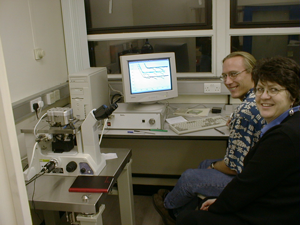
“Asylum might like to know that my purchase of your very first MFP instrument all those years ago has lead to me being awarded the 2010 Biophysical Society U.S. Genomics Award for Outstanding Investigator in the Field of Single Molecule Biology – the MFP is still my only AFM and is still turning out great data!”
"Our MFP-3D and Cypher are excellent tools. Thanks to their versatility, flexibility, and open source software we are able to provide high-level AFM support to the scientists accessing the European Photon and Neutron Campus (EPN) in Grenoble for cutting-edge X-Ray and Neutron Science. Being user-friendly, many ESRF students became confident with both the AFMs in a very short time."
Fabio Comin and Luca Costa, European Synchrotron Radiation Facility
“The MFP-3D-BIO is super easy to use. I can teach an undergrad in two hours.”
Brian Anderson, Associate Professor, University of Arizona
“You are the gold standard of AFM" (speaking about the MFP-3D-BIO)
Babak Sanii, Assistant Professor of Chemistry, Claremont College
"If you want to do cutting edge research don't cut corners. Get the best instrument (speaking about the MFP-3D-BIO).”
 公安机关备案号31010402003473
公安机关备案号31010402003473